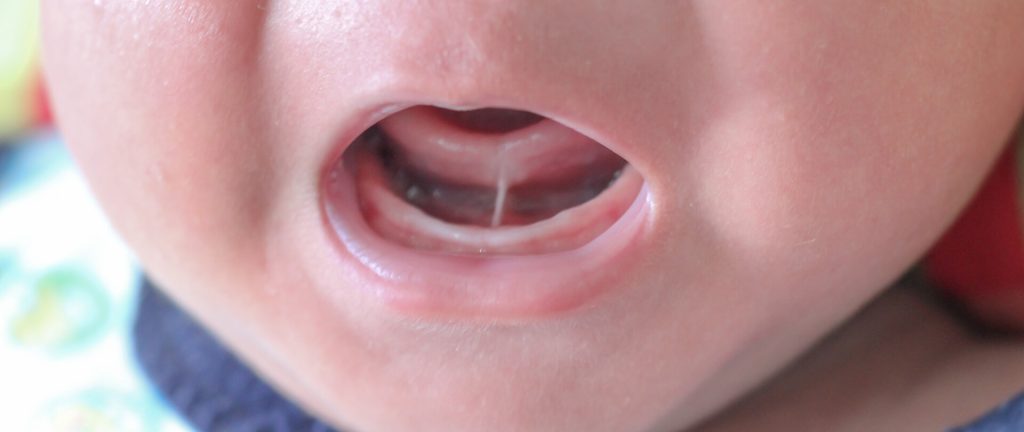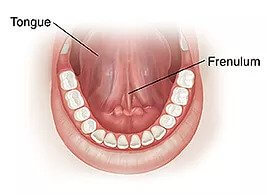INFANT TONGUE TIES
Infant Tongue Tie Symptoms and Treatments
Infant lip tie and
infant tongue tie

INFANT TONGUE TIE (LINGUAL FRENULUM)
Tongue tie, commonly referred to as Ankyloglossia, is a string of tissue called frenulum. This frenulum connects the underside of the tongue to the mouth’s floor and can be seen under the tongue through a mirror. The frenulum tissue can restrict the movements of the tongue and cause problems during Breastfeeding, Sucking, Swallowing, Eating and Chewing, Drinking, Breathing, Speech, Jaw growth, Posture and Digestion.

INFANT LIP TIE (LABIAL FRENULUM)
Infant lip ties are a similar band of tissue called the labial frenulum that adheres the lip to the gums at a level much higher than normal. This can lead to potential breastfeeding issues, a gap in between upper front teeth, cavities, inability to close the lips without strain, and speech difficulties.

BABY TONGUE TIE CAUSES
INFANT TONGUE TIE SYMPTOMS
Breastfeeding in infants is essential not only for weight gain but also for developed tongue function for the correct functioning of the jaw. Unsuccessful breastfeeding is often stressful for the mother and may affect her mental health. Unsuccessful breastfeeding may prompt the mother to use supplement bottles under the notion that she’s not producing enough milk. However, in certain cases, this may not be true. At times, there may be dysfunctions with the baby’s soft tissues that can be easily resolved. A failure to diagnose tongue and lip ties supplemented with bottle feeds affects jaw growth, airway development, and much more.
- Creased nipples
- Blanched nipples
- Bleeding nipples
- Painful latching
- Incomplete breast drainage after feeding
- Mastitis / Infected nipples
- Nipple Thrush
- Reduced milk supply
- State of mind: Anxious / Depressed
the following,
- Prolonged latching / long feeding hours
- Unsettled after feeding
- Short sleep duration
- Poor / shallow latch
- Chewing on nipples
- Reflux symptoms
- Colic symptoms / Gassiness
- Falls asleep during feeds
- Pulls body away from breast while feeding
INFANT TONGUE TIE DIAGNOSIS
INFANT ANKYLOGLOSSIA TREATMENT
- The baby’s history
- Clinical examination
- The severity of the condition

Dr. Shah is
Laser Certified
(GLOH), LLC to perform laser
frenectomies.
RISKS OF AN UNTREATED TIE
- Selective in chewing solid foods
- Speech defects
- Improper jaw growth
- Crooked teeth
- Sucking habits
- Mouth breathing
- Forward neck and shoulder posture
- Long term bed wetting
- Hyperactivity / Lack of attention (ADD, ADHD)
- Snoring / Noisy breathing
- Frequent nasal allergies and throat infections
- Teeth grinding
- Picky eating / Slow eating
TONGUE TIE RELEASE: AN AGE OLD TREATMENT
That means there are two to three generations that grew up with tongue-ties. It’s a large group of adults who are living in the dark and are experiencing its signs and symptoms that could unknowingly have a tongue-tie and its compensations.
OUR ADVANCED & GLOBALLY RENOWNED TONGUE TIE PROCEDURES:
Frequently Asked Questions
If your infant has tongue tie, you may notice the following while breastfeeding,
- Trouble latching
- Clicking sounds while feeding
- Trouble maintaining a latch
- Frequent feeds
- Poor weight gain
No, infant tongue tie release is not painful. Before the procedure, a numbing cream or solution is used for a painless procedure. Dr. Ankita Shah offers painless tongue tie release procedures. Her approach ensures minimal to no pain both during and after the procedure.
No, with Dr. Ankita Shah’s laser treatment approach, you can expect minimal to no scarring post-procedure. Dr. Ankita Shah is the only doctor who is Laser Certified by Global Laser Oral Health (GLOH), LLC, to perform laser frenectomies.
Blogs

Tongue Tie Compensations: Fascial Restrictions, Tension And Pain
Fascia is a connective tissue more like a spider web that provides our body a continuous 3-dimensional

6 Steps Of Assessment: Do I Have A Tongue Tie?
The back of the tongue should be resting high up on the palate. This helps in keeping the airway wide open.

What Exactly Is A Tongue Tie? How Does It Affect Us?
#DidYouKnow the tongue has 8 muscles which can exert 500gms of force? We have almost always neglected

The Unexpected Reason Behind My Son’s Picky Eating
As much as I joke about how difficult it is to get my kids to eat, I’m not joking today. My oldest son

Importance Of Teamwork In Evaluating Tongue Ties
Most often parents come to us after the diagnosis of a tongue or a lip tie with the thought process that a simple

Struggling During Breastfeeding? Let’s Find Out Why !?!
A woman’s body is remarkable. Not only can it grow another human being, but it can also provide

Tongue Tie Release For Children & Adults: How We Do It?
In our practice we use the Functional Frenuloplasty procedure to release tongue ties for toddlers,

Frequently Asked Questions On Functional Frenuloplasty
Your active participation is important to the post-operative success of your treatment.

15+ Myths (And Facts) About Tongue Ties And Lip Ties
The tongue is a mighty muscle essential for sucking, swallowing, eating, drinking, chewing, breathing,

Faq’s On Infant Laser Tongue Tie Release (Frenectomy)
A lot of mothers feel anxious when they hear their baby would need a tongue tie release. As a mother













